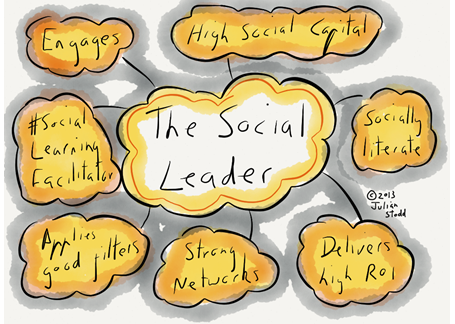I remember visiting my father at work. He was a university lecturer, and visits entailed walking through long corridors, past the refectory and library, until we reached a rather severe looking door, which we would knock on. After some time, the door would open, revealing a room strewn with paperwork, bookshelves piled high, chairs submerged under the weight of fallen trees and, at the back, a desk of such magnitude and authority that it positively groaned under it's own weight and kudos. All of which befitted a senior lecturer who had spent half his career there.
Today, I have no office: in the Social Age, my iPad is my office and I write this on the train. When it's done, I'll email it and take feedback by phone or online. Then you'll read it, probably digitally (unless you're in the diminishing herd of Palaeolithic leaders who get their PA to print out articles and emails to consume). Then, if I do a good job, you might share it. And if you share it, you're a social leader.
Or at least, if you share it and add a context, add some value, you are well on the way.
The world is changing: historic structures of power and authority are being subverted by newer, more personal styles. Reputation, based on your ability to create meaning, to take transformative action, is more valuable than longevity or the positional power gained by having a thirtieth floor office or gold braid on your shoulders.
Social Leadership can be defined by certain traits, of which sharing (and interpreting) are key. Social leaders ENGAGE in online communities and are engaging in their communications. They demonstrate HIGH SOCIAL CAPITAL, an ability to survive and thrive online, being familiar with both the technology and conventions, and they build social capital within their teams. They are highly SOCIALLY LITERATE, understanding and helping to define the terms of engagement in these spaces, with great clarity about the divide between the formal worlds of work and the informal layers that surround it, able to navigate and partition both appropriately.

Social leaders are SOCIAL LEARNING FACILITATORS, supporting the development of others and recognising the value of the semi formal layers of learning to bridge the gap between abstract formal training and everyday reality. They APPLY GOOD FILTERS to what crosses their desks, building their reputation by adding value to everything they pass on and filtering out the noise. They have STRONG NETWORKS that they actively curate to be broad and that the actively contribute to in order to build their reputation. And social leaders deliver HIGH RETURN ON INVESTMENT within their business, able to have data driven conversations and speak the formal language of business as effectively as the semi formal social ones.
Social leaders curate their reputation by taking action, by supporting others, by demonstrating humility and being willing to learn. Social leadership exists in an ecosystem that respects action, that appreciates support, that recognises that if you add no value, you have no authority, and that if you have no authority, you can't be a leader. Positional power no longer cuts the mustard.
You see, the very nature of work is changing: we used to gain power and authority through what we know, but today, it's more about your ability to form and support communities, to build transferable networks and to deploy them to make you more agile. If you are agile, you'll be able to respond to the fast paced challenges that a world in constant change faces. Not by solving those problems yourself, but by being able to form teams, consult your networks, and knowing where to turn to for challenge and support.
Sometimes you'll be reaching out for help, at other times you'll be offering it, because social leadership is as much about setting down the mantle of authority as it is about picking it up. Social leaders recognise that authority and power may be contextual, that we may take different roles in different teams, and be humble enough to accept this.
But why should we care about a more social style of leadership? Why can't we hang onto the older forms of power and authority that have seen us good so far?
Because the social contract is changing: there are no longer jobs for life, instead we roost with a business for a number of years before moving on. And in that time, we build and curate our reputation, detached from the organisation and adhered to our public networks. The formal worlds of work are colliding with the informal social lives that surround it, and only people who get this and can maximise the benefit of social working approaches will thrive. Social leadership is about helping to build and support those communities, so it's as much in our interests as the interests of others to adopt this style.
Why should we strive for a social leadership style within our organisation? Because it's based upon the social dynamics that we live within, it's the natural way of leading for the Social Age. Older leadership styles will find it increasingly hard to connect, to have relevance and meaning with a younger, more socially agile workforce. It's time to take up the mantle of social leadership.





